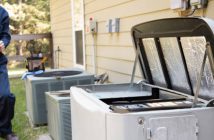Oregon businesses can use the power of the sun to fight rising energy costs, according to Bend-based contractor E2 Solar. The company cites state and federal programs that reduce upfront costs and increase the rate-of-return for renewable energy investments.
The United States Department of Agriculture (USDA) runs one such program called the Rural Energy for America Program (REAP). Each year, the REAP program distributes tens of millions of dollars to assist rural small businesses with installing renewable energy systems. REAP grants cover up to 25 percent of a project’s installation cost.
According to Sean Micken, E2 Solar’s sales director, the grant is tailored to favor small businesses and small to medium-sized projects. “The program has a set-aside quota for projects under a certain cost, and grading criteria awards more points to applicants that have fewer than 30 employees. So there is a real competitive advantage for smaller businesses that are looking to invest in relatively modest-sized systems.” The REAP program is only available to rural small businesses. The USDA defines “rural” as any area outside of a metropolitan area with a population of at least 50,000. Under its definition, all of central and eastern Oregon is eligible except for locations within the Bend city limits.
Micken recommends that businesses work with a professional grant-writer to help prepare a grant application. “The folks we work with are the best in the business. They have secured over 100 REAP grants with a success rate of about 95 percent,” Micken explains. “They know exactly what to do and how to make it as easy as possible for the project owner. Without the guidance of someone with this kind of experience, most folks never even make it out of the gate.”
Fortunately for business owners, grant-writing fees can be relatively modest, Micken contends. “Fees are typically less than $2,000. If the applicant is a Pacific Power customer, 50 percent of the cost can be reimbursed after the application is submitted. So, for less than $1,000, businesses can secure $50,000 or more in grant funds. That’s a pretty remarkable return.”
The USDA is only accepting applications through this spring for the 2014 REAP program so interested individuals should act now.
Utility rebates also help reduce the cost of installing renewable energy systems. Businesses that purchase electricity from Pacific Power can claim cash incentives through the Energy Trust of Oregon, which has a variety of programs to encourage investment in renewable energy and energy efficiency.
The Energy Trust’s commercial solar electric incentive rate was increased by almost 50% in 2013 to help stimulate Oregon’s commercial solar market. “While market momentum for residential solar installations has remained strong, demand for solar by businesses has waned,” explained Peter West, director of energy programs for the Energy Trust, in an April 2013 press release. “We determined that our incentives were insufficient to motivate customers given the current business conditions.”
Since the incentive rate was increased, the Energy Trust now covers between 25 and 35 percent of the upfront cost of a typical commercial solar project, according to Micken.“The incentive is as good today as it’s been for a long time”, Micken says, “but the market is starting to catch up. The rate will be scaled back as demand increases.”
Federal tax incentives are another carrot dangled in front of businesses and farms. In addition to accelerated depreciation schedules, companies that invest in solar and other renewables may claim a federal tax credit worth 30 percent of a project’s total cost. The tax credit value is slated to be reduced from 30 percent to 10 percent at the end of 2016.
“Now is a great time for businesses in Central Oregon to invest in solar,” Micken concludes. “Installation costs today are as low as they’ve ever been, and incentive programs are still strong. The iron is hot, and we’re looking to work with businesses that are ready to strike.”
Kelli Hewitt
E2 Solar, Inc.
541.388.1151 ext. 105



